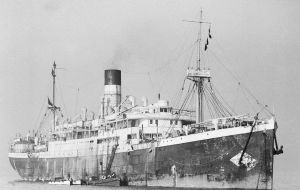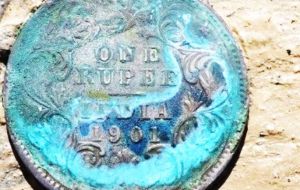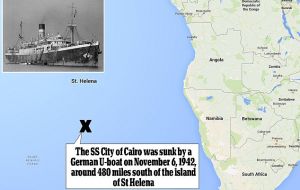MercoPress. South Atlantic News Agency
British team recovers U$S50m trove of silver coins from sunken ship south of St Helena
 The SS City of Cairo was torpedoed south of St Helena by a German U-boat and sank to 5,150m. The 100 tons of coins were recovered in the deepest salvage operation in history
The SS City of Cairo was torpedoed south of St Helena by a German U-boat and sank to 5,150m. The 100 tons of coins were recovered in the deepest salvage operation in history  The silver rupees had been called in by London to help fund the war effort, but never made it.
The silver rupees had been called in by London to help fund the war effort, but never made it.  The ship and cargo were presumed lost until 2011: a team led by British salvage expert John Kingsford located an unnatural object among the ridges of the South Atlantic
The ship and cargo were presumed lost until 2011: a team led by British salvage expert John Kingsford located an unnatural object among the ridges of the South Atlantic A British-led team has recovered a $50m trove of silver coins that has lain on the seabed since the steamship carrying them from Bombay to England was sunk in 1942. The SS City of Cairo was torpedoed 772km south of St Helena by a German U-boat and sank to 5,150m. The 100 tons of coins, recovered in the deepest salvage operation in history, belonged to HM Treasury.
The silver rupees had been called in by London to help fund the war effort. But they never made it. The steamship's tall plume of smoke was spotted by a U-boat on 6 November 1942 and it was torpedoed. Ten minutes later, amid efforts to abandon ship, the City of Cairo was hit with a second torpedo which sealed its fate.
The ship and its cargo was presumed lost until 2011, when a team led by British salvage expert John Kingsford located an unnatural object among the ridges and canyons of their South Atlantic search area.
Under a contract with the UK government, underwater salvagers Deep Ocean Search (DOS) worked for several weeks searching a “jumbled up sea floor” twice the size of London, Mr Kingsford told the BBC.
“We weren't convinced at first,” he said. “But you have to give your team their head if they say they've found something, so we looked.”
The object was indeed the City of Cairo, and the team recovered a “large percentage” of its £34 million treasure chest. “There was a lot a relief all round,” Kingsford said.
The coins have now been melted down in the UK and sold, with the undisclosed sum divided between the treasury - which technically owns the coins - and the salvagers, who take a percentage of the sale.
The salvage was completed in September 2013, but DOS has only now been given permission by the Ministry of Transport to announce it. As well as the coins, the team brought up the propeller belonging to the second, fatal torpedo.
Shortly after that second torpedo struck 73 years ago, and the last remnants of the City of Cairo disappeared beneath the waves, the U-boat surfaced and approached the survivors' lifeboats.
Its captain, Karl-Friedrich Merten, famously directed them to the nearest land and said: “Goodnight. Sorry for sinking you.”
Only six of 311 people aboard died in the sinking, but it would be three weeks before anyone found any of the six lifeboats that had set out for land. In that time, 104 of the 305 survivors died.
The British SS Clan Alpine picked up 154 survivors alive on the way to St Helena and a further 47 were rescued by a British merchant ship, the Bendoran, and taken to Cape Town.
A final lifeboat was discovered 51 days after the sinking, off the coast of South America, with only two of its many passengers alive. In a cruel twist of fate, one of the two men, Third Officer James Allister Whyte, died shortly after when the ship taking him home was torpedoed by a U-boat.
After leaving the wreck for the final time, the divers left a plaque in honor of those who died which read: “We came here with respect.”
“It was a special salvage,” Kingsford said. “It does mean a lot...It was a very emotive case, where over a hundred people were lost having been in open boats. It meant a lot to our team to find this ship and remember it”. (BBC).




Top Comments
Disclaimer & comment rules-

-

-

Read all commentsNo, paulcedron, those silver coins DO NOT belong to Argentina.
Apr 16th, 2015 - 10:48 am 0l know that the Atlantic washes the Argentine coast, but the shipwreck was far, far away from RGland.
Just getting in first before you made some of your usual wild, unsubstantiated, ridiculous claims. lol!
“pirates ahoy!”
Apr 16th, 2015 - 11:28 am 0(just jokin')
“Pieces of Eight...Pieces of Eight”...stupid parrot...wrong period...
Apr 16th, 2015 - 11:39 am 0“Pieces of Rupee...Pieces of Rupee”...
Commenting for this story is now closed.
If you have a Facebook account, become a fan and comment on our Facebook Page!